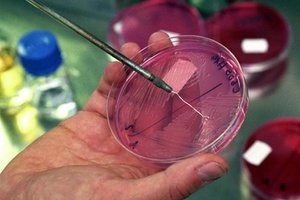Tuberculosis trials, already struggling, hit hard by US sequester
The cuts come at a time when many in the tuberculosis community feel that new treatments are within reach.
The US federal spending cuts imposed by the so-called sequester have made a brutal dent in research spending: the country's National Institutes of Health (NIH) and National Science Foundation are among the agencies that must shed roughly 5% of their budgets this year. That's bad news for research on global killers such as cancer and HIV/AIDS, but the prospects are perhaps even bleaker for fields that are already underfunded, such as research into tuberculosis.
According to the New York–based advocacy organization Treatment Action Group, tuberculosis research received $209 million from the NIH in 2011—a small sum, critics complain, compared with the $3.1 billion the agency invested in HIV/AIDS research. That same year, the tuberculosis pandemic was responsible for 1.4 million deaths, almost as many as attributed to HIV/AIDS.
“Our budget [for tuberculosis research] is very small to begin with. We're a very lean-and-mean operation,” says Neil Schluger, who chairs the steering committee of the Tuberculosis Trials Consortium (TBTC), a research nexus based in Atlanta that conducts tuberculosis clinical trials across nine countries in collaboration with the US government, nonprofits and drug companies. “Now, because of sequestration, our consortium is receiving cuts at a time when we have some of the most exciting research results we've ever had.”
Over the past three years, the TBTC has seen an approximate 10% drop in its budget, which is determined by the US Centers for Disease Control and Prevention (CDC) and which peaked in 2008 at $10.4 million, according to Schluger. This year, the consortium learned it would be facing dramatic additional reductions as a result of the sequester. Although the cut was initially proposed to be as high as 30%, as Nature Medicine went to press members were hoping that it would not exceed 13%. In anticipation, the TBTC has begun shutting down three of its 20 clinical sites. In Durham, North Carolina, Washington, DC, and Rio de Janeiro, Brazil, TBTC clinics have ceased enrolling patients and begun laying off nurses and doctors. Other sites have been reduced, and if the budget cut is increased more sites will probably close.
By comparison, the AIDS Clinical Trials Group, the major NIH clinical research organization for HIV/AIDS, is expecting a maximum 6% cut in funding, according to a source at the US National Institute of Allergy and Infectious Diseases. Though less consolidated than other infectious disease research in the US, malaria programs are also facing smaller cuts. The Parasitic Diseases and Malaria program at the CDC Center for Global Health—which includes malaria control as well as research—will be cut by 5.2%,according to information provided by the US National Institute of Allergy and Infectious Diseases.
Clinical sites like those of the TBTC fostered the development of new tuberculosis treatments, which are necessary to combat a pandemic disease that increasingly shows drug resistance. As of 2012, there were more than 70 drugs in the clinical pipeline for HIV/AIDS but only 8 for tuberculosis.
The cuts come at a time when many in the tuberculosis community feel that new treatments are within reach. In 2011, members of the TBTC published a paper demonstrating that the antibiotic rifapentine, sold as Priftin by France's Sanofi, could reduce the duration of treating latent tuberculosis from nine months of daily doses to three months of weekly doses (N. Engl. J. Med. 365, 2155–2166, 2011). This past May, at the American Thoracic Society's annual meeting in Philadelphia, Susan Dorman of the TBTC presented research suggesting that two months of treatment with rifapentine could yield sputum cultures clear of disease from people previously diagnosed with active tuberculosis.
The consortium, excited at the promise of rifapentine and the newly approved drug bedaquiline (sold by New Jersey's Janssen Pharmaceuticals as Sirturo; see Nat. Med. 18, 1157, 2012) had planned advanced trials for both drugs. However, in light of the sequester and likely future cuts to tuberculosis research, Schluger and other members of the consortium think these trials will be delayed by years, if not permanently.
In addition to the TBTC cuts, news reports have raised the possibility that tuberculosis research might suffer the further setback of a $45 million funding cut in 2014 by the US Agency for International Development, which represents 20% of its budget for the disease.
Mario Raviglione, director of the World Health Organization's Stop TB Department in Geneva, thinks tuberculosis lacks the social and visceral pull that other maladies have when it comes to funding. “HIV is a disease that involves one of the most important aspects of human life—sex,” he says. “Tuberculosis involves the sputum of poor people, and the poor are without voice in most societies.”
Source: Nature Medicine


